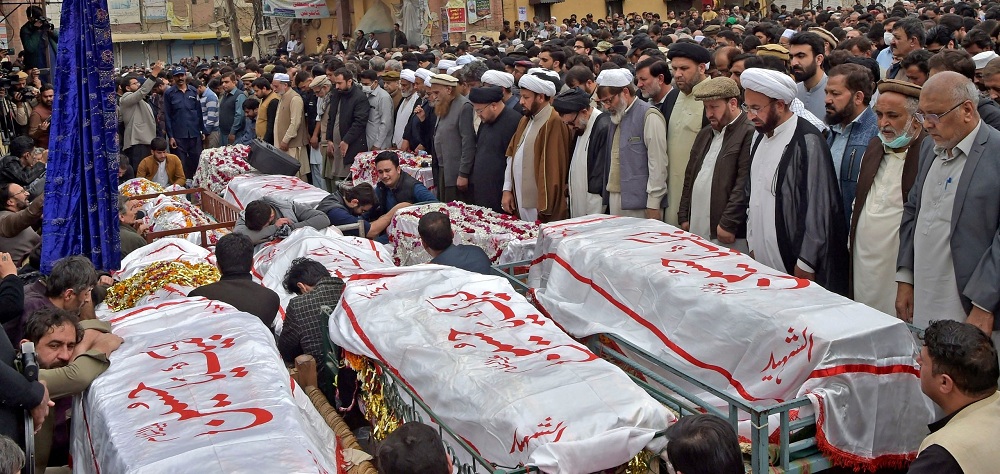Alwaght- A day after deadly blast in a Shiite mosque in Pakistan's Peshawar, ISIS terrorist organization claimed responsibility for the attack.
The attack, the deadliest since 2018 suicide blast, ripped through a mosque of Shiites in Kucha Risaldar neighborhood of Peshawar in northwest Pakistan, razing the religious place to the ground. Mohammed Assem Khan, the spokesmen to Lady Reading Hospital in the city, said that over 56 worshipers were killed.
Peshawar, located 50 kilometers from the Afghan border, has been the target of attacks since the beginning of the last decade, but the security situation has greatly improved in recent years. Meanwhile, the United Nations, Turkey and Arab countries, including Saudi Arabia, Kuwait, the UAE, Egypt and Jordan, in separate statements condemned the attack.
The Secretariat of the Organization of Islamic Cooperation (OIC) also condemned the bombing "in the strongest terms," emphasizing its support for the Pakistani government in the fight against terrorism.
Is Pakistan stricken by ISIS?
Peshawar has been safe for a couple of years, and now, for the first time in three years, a terrorist attack has upset its security.
Although it cannot be certainly claimed that Peshawar explosion gives a sign ISIS is stepping up its activities in Pakistan, the attack rings the alarm to the Pakistani leaders about a risk of backslide into insecurity. Over the past few decades, Pakistan has been a hub for growth of takfiri and fundamentalist groups, which have always been referred to as the proxy arms of Pakistan. Lashkar-e-Jhangvi, the Tehreek-e-Taliban Pakistan (TTP) and dozens of other fundamentalist groups have grown in the country over the past few decades. Members of these groups joined the terrorist group at the same time as ISIS was formed in Iraq and Syria in 2014, and a significant number of ISIS. In other words, ISIS is an offshoot of these groups.
"While reporting from Syria, a terrorist group's source told me that there were about 150 Pakistani fighters there," said Hassan Abdullah, a journalist specializing in terrorism in Pakistan, adding: "They preliminarily joined [Lashkar-e-Jhangvi] extremist group and then joined ISIS."
To be precise, part of ISIS's activities harming security in Pakistan is the result of Islamabad's years of support for fundamentalist groups that have now joined forces with ISIS.
Pakistan, on the other hand, has traditionally had a history of religious strife, and there is a number of fundamentalist groups in the country that bear many similarities to the ideology of ISIS. A few years ago, a number of TTP leaders swore allegiance to ISIS, and there have been several attacks on shrines, and mainly Shiites holy sites.
At the same time, ethnic and tribal divisions under the cover of fundamentalism and the tendency towards ISIS in Pakistan cannot be disregarded, and since there is a variety of tribes in the country, some of these them aim to take revenge on the opposing tribes by joining ISIS. No matter what the roots of ISIS are, the terrorist group now poses a security threat for Islamabad, while Pakistani leaders are not interested to see their country's conditions going tense by the group.
ISIS danger to Pakistan
Though Pakistan views positively and supportively the Taliban power takeover in Afghanistan, it sounds like ISIS has grown larger since the Taliban gained the power in August last year, as evidence emerges to show the terrorist group has infiltrated all the Afghanistan provinces. Even after the Taliban came to power on August 15, ISIS carried out five deadly attacks in Kabul, Kunduz, and Kandahar, in addition to small-scale bombings targeting the Taliban and civilians in various provinces and regions. At least 450 people were killed and 400 were injured in these attacks.
But Pakistani state and security officials have always rejected ISIS, or even its partners, existence in the country. In May last year, however, Pakistan counterterrorism service in reported killing of 4 ISIS members in Punjab province.
Even Islamabad Policy Research Institute (IPRI), which ranks first in Pakistan and 74th globally, earlier in a report focused on ISIS attacks in Pakistan since 2016, suggesting that "ISIS would pose a serious security challenge" to both Islamabad and any new Afghanistan government led by the Taliban.
With this in mind, it can be concluded that ISIS now is a big security challenge in Pakistan and intensification of its activities can take the calm from the country.



























